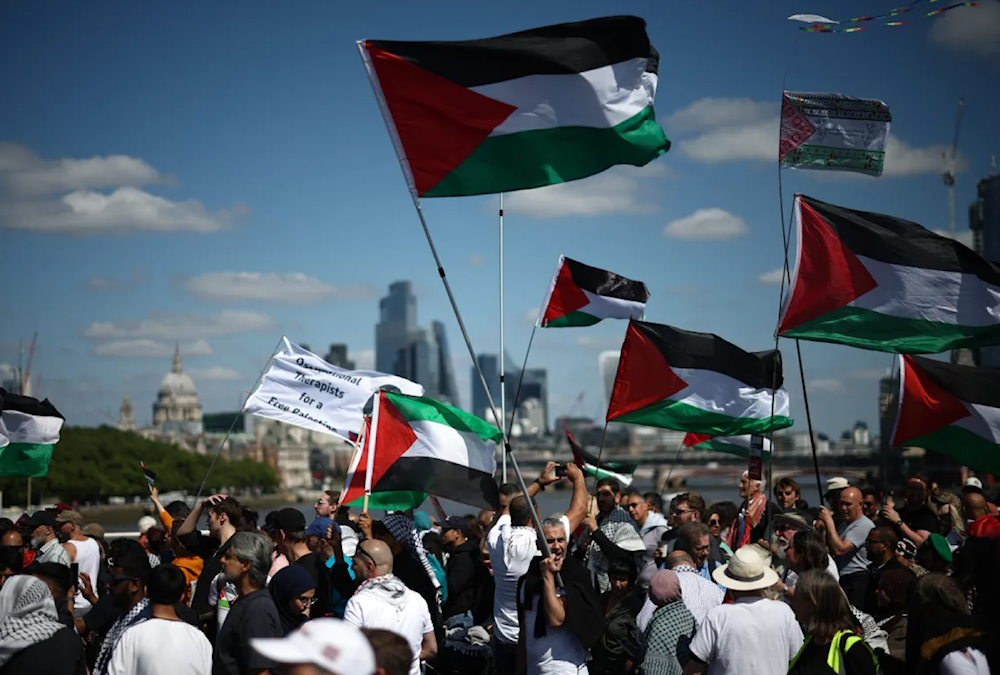'Paddystinian': How slur became badge of Irish pro-Gaza solidarity
The term's supposed origins as an insult have only accelerated its adoption on platforms like TikTok, where Irish users now identify as "Paddystinians".
-

Pro-Palestine supporters wave Palestinian flags as they march across Waterloo Bridge in Central London, UK (AFP)
Once believed to be a derogatory term coined by supporters of "Israel", the neologism "Paddystinian" has been reclaimed by Irish activists as a symbol of solidarity with Palestine and resistance to the war on Gaza.
Originally intended to mock Ireland’s pro-Palestine stance, the term has been embraced as a badge of honour, now proudly displayed on T-shirts, hoodies, pins, and social media bios.
Activists have turned the term into a rallying cry, using it to campaign against Israeli atrocities in Gaza and to push the Irish government to take stronger steps toward ending the aggression.
Its supposed origins as an insult have only accelerated its adoption on platforms like TikTok, where Irish users now identify as "Paddystinians", and in a playful twist on the traditional name Biddy, some women are calling themselves "Biddystinians."
From derogatory to positive
“It was being used as a negative,” said Ross McGann, a TikToker with nearly 40,000 followers. “Once I heard that, I thought: ‘Nah, we can flip this around.’ It’s a very Irish thing to do – you take an insult and you flip it back.”
The 35-year-old content creator, who lives on a farm in County Offaly, has woven the term Paddystinian into his TikTok bio and videos, many of which have gained wide traction.
“The word paddy has been used in a derogatory sense towards Irish people, but in my family we have lots of Patricks, so to us paddy is a positive word. Given what’s happening in Gaza, I thought it’s only fair that we own it.”
New layer of Irish pro-Palestine activism
The spread of the term has added a new layer to Irish activism around Gaza, surfacing alongside ongoing controversy surrounding the rap group Kneecap. Liam Óg Ó hAnnaidh, a member of the group, has been charged with a terror offence in the United Kingdom after allegedly displaying a Hezbollah flag during a performance in London.
While the exact origin of Paddystinian is uncertain, it gained wider attention in December when "Israel" closed its embassy in Dublin, accusing the Irish government of antisemitism and extreme hostility.
From symbol to strategy: Turning solidarity into political pressure
Merchandise featuring the term "Paddystinian", including pins, badges, and clothing, has gained popularity, with some groups like Uplift donating proceeds to Gaza aid. Izzeddeen Alkarajeh, a Palestinian cafe owner in Cork, reports strong pin sales, calling it a powerful example of reclaiming a once-mocking term. He says the word, along with support from artists like Kneecap, is helping raise awareness about Palestine among young Irish people, reflecting Ireland’s long-standing solidarity with the oppressed.
Jilan Wahba Abdalmajid, the Palestinian ambassador to Ireland, praised the country’s strong show of solidarity. “Any link between the Irish people and the Palestinian people is a positive one," she said. "I hope the Irish people feel the same. We share the same history of colonisation and know too well how important freedom, justice, and human rights are.”
Activists say their aim is to translate this solidarity, especially the growing online movement, into political pressure on the Irish government. They are calling for concrete actions, including passing a bill to ban trade with illegal Israeli settlements in the West Bank, halting the Irish central bank’s approval of Israeli bond sales in Europe, and restricting the use of Irish airspace for flights suspected of transporting military supplies to "Israel".
“Our pressure point is the Irish government,” activist Lawlor said. “The rhetoric is very strong, but they have to back it up with actions. If they do that, we can start a snowball effect within the EU.”

 4 Min Read
4 Min Read








